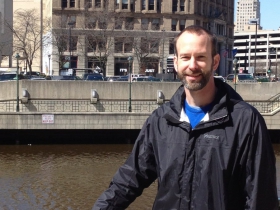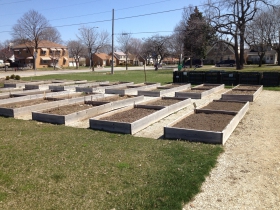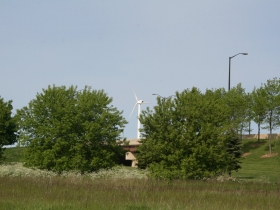The Greening of Milwaukee
Year by year, city Sustainability Director Matt Howard is helping transform Milwaukee.
Matt Howard is Milwaukee’s Mr. Green. Since, June 2010, when he was appointed the city’s Environmental Sustainability Director, Howard has overseen a wide range of initiatives, installations, programs and partnerships that are transforming Milwaukee into a more sustainable city. And the more green Milwaukee becomes, the more taxpayers save. “For every energy dollar the city has spent,” Howard notes, “the community sees eight dollars in savings.”
A St. Louis native, Howard holds a B.A in international economic and cultural affairs from Valparaiso University as well as an M.A in international economic and trade policy from The George Washington University. So even though he is now in charge of environmental initiatives, Howard sees himself as an economist first. “My interest in sustainability does really stem from my background in economics.”
After graduate school, Howard began his career with the U.S Department of Agriculture for a year and a half, spending most of his time assembling foreign aid packages. Next he joined the U.S Department of Commerce where he would more or less be employed for the next 11 years, shuffling around to various government entities in D.C. This, he says, “is fairly common on Capitol Hill.”
“I was looking for Sustainability Director positions and I was already familiar with some of the things happening in Milwaukee at places like Rockwell Automation and Johnson Controls.” The proximity of family in the Midwest helped seal Howard’s decision to come to Milwaukee when the job was offered.
Howard has been very busy since assuming the position, handling a long list of projects. A key one is the city’s Green Corridor — an area centralized on South 6th street between Howard Ave. and College Ave that is dedicated to experimenting with sustainable public works. “It is basically a sort of lab for collaborative green management,” Howard says. While the initial focus of the Green Corridor was storm water retention, it has since stretched into an ongoing discussion of all things green and sustainable.
Howard was also a central influence in installing the city’s first wind turbine at the Port of Milwaukee, completed in February 2012. The turbine, visible from I-794 in Bay View, powers the Port Administration building at 2323 Lincoln Memorial Drive. It is now the first net zero-energy city building: totally self-sustaining, relying only on the turbine-created energy.
Then there’s the Me2 program, one of the landmark initiatives Howard has overseen. “The objective is to help residents afford the upfront cost of building and installing green additions and updates to their homes,” Howard says. Me2 focuses primarily on providing financing terms to facilitate installing anything from attic and wall insulation to heat pumps to solar panels, with flexible loan terms of up to 15 years through Summit Credit Union. And with no money down, no credit requirements and no equity, Howard feels the program terms are quite accessible, which is probably why Me2 has contributed to updating almost 1,300 homes since 2010. Me2 also focuses on businesses through PACE (Property Assessed Clean Energy) financing. Howard says that 139 businesses have taken advantage so far.
Which brings us to the next number up, the Me3 program, (the Milwaukee Economy, Energy, & Environment program), which helps small- to medium-sized manufacturers improve their energy efficiency. The idea is to help them identify where they could cut operating costs while also reducing their environmental impact. So far, 26 manufacturers have helped save themselves millions of dollars and divert almost 10,000 tons of waste from the landfill.
What Howard seems most excited about, however, is a program called ReFresh MKE. “If you really want to know what a big focus at my office is, this is really it,” he says. Introduced in July 2013, ReFresh MKE is a 10 year plan (Howard prefers “road map”) that sets goals and timeframes and provides a quantifiable vision for community sustainability across a wide variety of areas.
It all started in 2012 when Mayor Tom Barrett appointed Howard as the chair of what was called the “Green Team”. This was a 15-member team tasked with developing an overarching sustainability strategy, which spent 18 months working in tandem with roughly 1,500 residents and about 100 local businesses. “The plan was essentially created by the community,” Howard says. “The Green Team took the data from their input and distilled that to figure out what the common ideas and concerns were.” What came out the other end was ReFresh MKE, Milwaukee’s first, broad-based sustainability plan.
Since Howard became Sustainability Director, there has been about a $500,000 annual drop in the energy bill for the roughly 140 City of Milwaukee buildings. And there’s that 8:1 overall energy spending return for the city.
“The way I see it, sustainability has what you could call three pillars: there is the environmental, the social, and the economic.” And Howard believes the latter two pillars often get overlooked. Sustainability, he notes, is not at odds with economic development, but actually enhances it. “Sustainability should really be looked at as a competitive advantage for Milwaukee. It can only make the city more attractive.”
And that’s good news for the mayor. Barrett calls Howard “a trusted advisor and a key resource in defining the future of Milwaukee. He has demonstrated his ability to engage the business community and protect economic development while not losing sight of our obligations to the environment.”
Howard and the mayor both believe the greening of Milwaukee will have significant long-term benefits. Barrett’s prediction: “The solutions we are putting into place now will last longer than my term in office and perhaps my lifetime.”
Political Contributions Tracker
Displaying political contributions between people mentioned in this story. Learn more.
- March 15, 2016 - Tom Barrett received $100 from Matt Howard






















What a tedius waste of public funds. A director for environmental sustainability? As i drive through the streets of milwaukee i am reminded constantly of the fact that the high property taxes makes homeowner reinvestment in their property a nonstarter. Why should someone who is already looking at 3x the tax rate of the surrounding areas spend an annual 2-3k in re-siding the house, re-doing the carpets, re-roofing, or any of the other number of things that can spruce up a house and spruce up a neighborhood.
Milwaukee needs to figure out how to cut such examples of wasteful bureaucracy which only serve to please specific interest groups in the city.
They DO NOT enhance the city or improve it in any appreciable manner.
A commitment to sustainability is a proven driver in attracting the Millennial generation which, increasingly, chooses cities as their preferred place of residence. To remain competitive in attracting the best and brightest – who will drive our current and future economy – this commitment is fundamental. I consider this a profound enhancement to our City and a necessary priority.
In addition to workforce attraction, the growth sectors in our economy are all pointed toward industrial and manufacturing adaptation of more environmentally sustainable products, processes, and innovations. Our position as a global innovator will increasingly be dependent on how well we lead and adopt these strategies as both public and private priorities.
Finally, on top of making us more competitive and creating a preferred quality of life, the public investment in these strategies, as noted, has already resulted in significant energy savings. I would consider it both ignorant and wasteful to not invest in energy efficiency. This is also fundamentally important to me as a taxpayer. This is not a special interest, but in all of our interests to reduce costs wherever possible.
Kudos to Matt Howard for his leadership in driving important policy changes. He is an innovator within a bureaucracy, a role that is not easy. He has proven adept at navigating issues together with both public and private sector stakeholders to advance change for the common good. His retained love for his native Cardinals notwithstanding, I’m glad he now calls Milwaukee his adopted home.
Great stuff! Glad to see so much going on.
To the idiocy in the previous comment – sustainability almost always pays off financially. It saves you money, dude. In addition to helping the environment.
Compliments to the city of MKE and to Matt Howard for embracing change that is important, expedites energy savings, engages the business community, employs academic research and returns benefits to the taxpayer that otherwise would be missed.
Progressive stuff ! More people should know about Matt Howard’s efforts.
I love when people complain about property taxes without actually looking at what property taxes are. All municipalities in Milwaukee County charge higher property taxes than suburban counties because they have been around longer and have more stuff to pay for. However, the commenter above singles out the City of Milwaukee when it doesn’t have the highest property taxes in Milwaukee County (that award goes to West Milwaukee). Milwaukee’s property taxes come in at 5th in the county behind West Milwaukee, Brown Deer, Shorewood, and West Allis. @Davis Carlson – do you have the same issues with those communities as you do with Milwaukee? Also, as home values in Milwaukee average far less than most suburban counties, your actual tax bill will likely end up being much lower than most suburban homeowners (as is the case for me).
Educate yourself – http://publicpolicyforum.org/sites/default/files/2012PropertyTaxPoster.pdf
Thank you Matt and the City of Milwaukee for the job and effort you are doing in this area. It is greatly needed as our entire state continues a backward slide on this front. Most educated people know that a commitment to energy efficiency, renewable energy, recycling, local use of products and services, etc. makes an extremely positive difference economically and socially. Wisconsin spends $12 Billion annually on imported energy. Every dollar that is saved locally is magnified at least three-fold, keeps dollars here, and spurs the local economy with funds spent elsewhere. Energy savings pile up every year and is great for business development.
It is technically feasible to lower energy consumption in the State of Wisconsin by 50% in a few decades time. That would save up to $6 Billion annually every year thereafter and provide economic forces to keep stimulating the Wisconsin economy.
thats exactly the point, though. Since property taxes are so high in MKE county, there is no marginal budget for making improvements. Since there is no budget for home improvements, year over year there is downward pressure on home values in milwaukee relative to outside areas. My overarching point here is related to the laffer curve (use wikipedia!) showing that having such high taxation actually may be, ironically, pushing downward pressure on the public tax revenues in MKE county.
Overall, if folks knew they had a bigger portion of their money to make improvements, they wouldnt be so PUNISHED for making them! since a much higher percent of improvements goes on to increase their tax burden.
Davis Carlson – tax policy is another policy issue. A County like Milwaukee that is mostly urban is unique in the State of Wisconsin. If we were allowed to keep all of our income tax, sales tax, gas tax, registration fees, etc. we would be in great shape. Instead for over 150 years, Milwaukee County has been supporting the rest of the state and really obtains so little in return. Maybe it is time the siphon was turned the other way, and all tax funds stay here and utilized here. We would be fine and State government really has nothing to offer. Furthermore, all income tax from jobs in Milwaukee County, stay in Milwaukee County.
The state-wide Focus on Energy fund is financed to about $200 million annually by utilities. This fund should be tripled over time. Energy efficiency and renewable energy programming are job creators with local services and materials used for building remodeling. Programs like Milwaukee’s provide further incentives to promote energy savings.
Dave Carlson, you’re taking too broad a look at sustainability and the costs associated with it. There is actually green technology and green improvements that pay for themselves. Johnson Controls and Rockwell both have guild technologies that save money. The reason you cite to not build green infrastructure or have a director of environmental sustainability (high taxes) is actually the very reason Milwaukee SHOULD have those things.
Because I live in Milwaukee and because I believe my taxes are too high, I believe Matt Howard plays a role in and has a responsibility to me and my fellow residents in order to help lower our tax liability. Sounds like he’s doing just that.
As a side note, I’m disappointed with the broad brush you paint Milwaukee with. There are plenty of areas in Milwaukee that see a lot of investment in updating and enhancing individual residences. Would lowering the tax bill help increase property values? Heck yeah. But that does not mean there is zero value and no improvements taking place.
The ReFRESH Milwaukee is a must read for everyone in the city as it highlights initiatives to adopt contemporary and forward looking practices. Having contributed to the Milwaukee River Greenway Corridor, the North East Side Plan, Smart Growth Guidelines for the city, there are so many opportunities to showcase what Milwaukee has done, is doing, and plans to do! An idea would be the next city calendar that month by month encourages changes in individual home awareness and practices. Taking a survey to see how sustainable practices are taught in our schools would encourage teachers to incorporate more environmental education and learning out doors right on their school campuses and connect teachers with EE professional development opportunities. Greening Milwaukee’s schools (like Greening Shorewood did at Shorewood High School) gets students, faculty and the community involved and working together toward sustainable practices. Promoting Milwaukee as a city with green schools will not only develop new jobs but will attract and retain new families. If we educate for sustainability in our schools, K-middle, we will have many more high school students engaged. The National Environmental Education Foundation has created some great posters available to schools for free- STEM and our Planet; Ten Apps for Learning Outside; and Technology and the Environment(http://eeweek.org/engineering-sustainable-world). A National Environmental Education Foundation Green STEM Innovator , NEXT.cc, (www.NEXT.cc) offers connected eLearning opportunities to introduce young imaginations to digital fluency and eco literacy. Preparing youth as future leaders with new understandings invests in the triple pundit for our city.
Thank you Linda Keane. Working with young people and seeing them at work and education, recharges elders like me and provides hope for the future. For ignorance truly is bliss, and in our current state legislature we have the least educated in modern history.